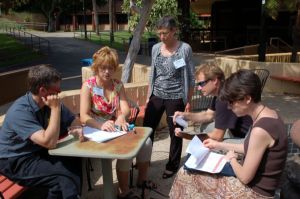
Identifying the right time to ramp up courses for new technologies is one of the key challenges of science, technology, engineering, and math educators. Picking the wrong technology leaves students without jobs; waiting too long to add skills for a new, essential technology could mean that a college loses students to competitors. To help it sort out information about emerging technologies, the National Science Foundation has historically found it useful to support meetings where the best and the brightest people working in fields related to the one on the horizon discuss what they think is ahead.
On May 23 and 24, the Northeast Biomanufacturing Center and Collaborative (NBC2) based at Montgomery County Community College gathered 83 individuals involved in either the biofuels industry or biofuels education to share their thoughts about trends in the development of biofuels. During the meeting at Kapi’olani Community College in Honolulu, Hawai’i, the summit participants shared their ideas about the best ways to educate technicians for careers in the emerging biofuels industry. The educators and biofuels industry leaders, who included several biodiesel and microalgae pioneers, worked in small groups on the skill standards. Vicki Glaser, executive editor of Industrial Biotechnology, led the group in the photo that opted to discuss the skill standards outside on the beautiful campus.
Summaries of the participants' presentations and the complete draft skill standards are contained in Educating Biofuels Production and Analysis Technicians for Future Industry Needs: The Report from the Biofuels Workforce Summit. The report was released at the 20th ATE Principal Investigators Conference (October 23 to 25, 2013) in Washington, D.C. For copies of the report contact Jennifer Imbesi at jimbesi@mc3.edu.
Sonia Wallman, NBC2 principal investigator and executive director, expects center personnel will gather more industry feedback before finalizing the skill standards. At the summit, Wallman likened the center's work on biofuels to "Wayne Gretzky skating ahead of the puck.” She and others at the summit agreed that products like green crude from algae and aviation fuel from biomass need technological breakthroughs before they can be mass produced in quantities and at prices that compete with petroleum-based fuels.
But the U.S. military's search for ways to lower its energy costs and reduce its reliance on fossil fuels is priming the pump for the expanded use of biofuels. Interest in biofuels is also quite high in Hawai‘i due to residents' desire to lessen their costs for imported fossil fuels and preserve the islands' unique ecosystem.
The potential need for skilled biofuels technicians in the next decade was clear from summit presentations about the U.S. Navy's goal for alternative fuels to provide 50% of the energy its uses ashore and at sea by 2020, the technological advances that already convert waste cooking oil into high quality biodiesel, and the unmet demand for skilled technicians at refineries that produce ethanol from corn.
Biofuels Employers Expectations of Entry-level Technicians
Adelheid Kuehnle, chief executive officer of Kuehnle AgroSystems in Oahu, Hawai’i, said a technician’s ability to work as an effective member of a team with scientists is critical. “Regardless of who we have on our team and what they do, they have to demonstrate creative thinking, the ability to be a team player, and also just understanding[of the company’s scientific processes],” Kuehnle said. Her biosciences company collects microalgae, characterizes them, and optimizes them for specific traits and performance.
Kelly King, vice president of Pacific Biodiesel Technologies, LLC, said her primary expectations for entry-level technicians include basic technical skills and an understanding of various biofuels production processes. “They need to know basic skills: how to use certain types of instruments; how to do measurements; how to identify standard operating procedures [and] follow them; how to write standard operating procedures; [and] things like that. And then they need some basic information; They need to know the difference between the different types of biofuels ... then they can specialize from there,” she said. Pacific Biodiesel has built 13 production plants in the U.S. and Japan; its Big Island Biodiesel Refinery can distil diesel fuel from waste cooking oil, grease trap residues, as well as seed crops like jatropha and kukui.
Kuehnle, King, and Wallman continued the discussion of biofuels technicians' skills with other educators and industry leaders during a mid-summer roundtable. Industrial Biotechnology published a transcript of their discussion in the journal's October issue.
Advice to Community College Educators
At the Biofuels Workforce Summit in May, Matthew Croughan, chief technology officer of Sapphire Energy, advised community college educators to add biofuels as an option to existing biopharmaceutical manufacturing programs. “Ideally, keep both going so students can go either way,” he said, adding, “Biofuels is coming up, but don’t give up on biopharmaceuticals because it’s a very successful industry.” Croughan was the chief scientist at Genentech’s cell culture facility in Vacaville, California, before becoming the George B. and Joy Rathmann Professor at the Keck Graduate Institute in Claremont, California. He has also directed the institute’s Amgen Bioprocessing Center.
Croughan offered the following advice to community college educators as they prepare students for biotech careers, in general, and biofuels employment, in particular:
• stay engaged with industry;
• keep track of what’s happening with industry;
• stay connected with other biotechnology educators to share knowledge, best practices, and insights; and,
• adjust your programs as necessary.

 Subscribe
Subscribe


 See More ATE Impacts
See More ATE Impacts

Comments
I recently read the report from this and I noted the need for technicians to "communicate clearly with customers" and "pay attention to safety" as employ-ability skills. I noted the emphasis on paying attention to safety as opposed to just knowing the safety requirements. Also the ability to communicate (with customers) seems to be an ever increasing need. It wasn't just communication but communication with customers that was called out.